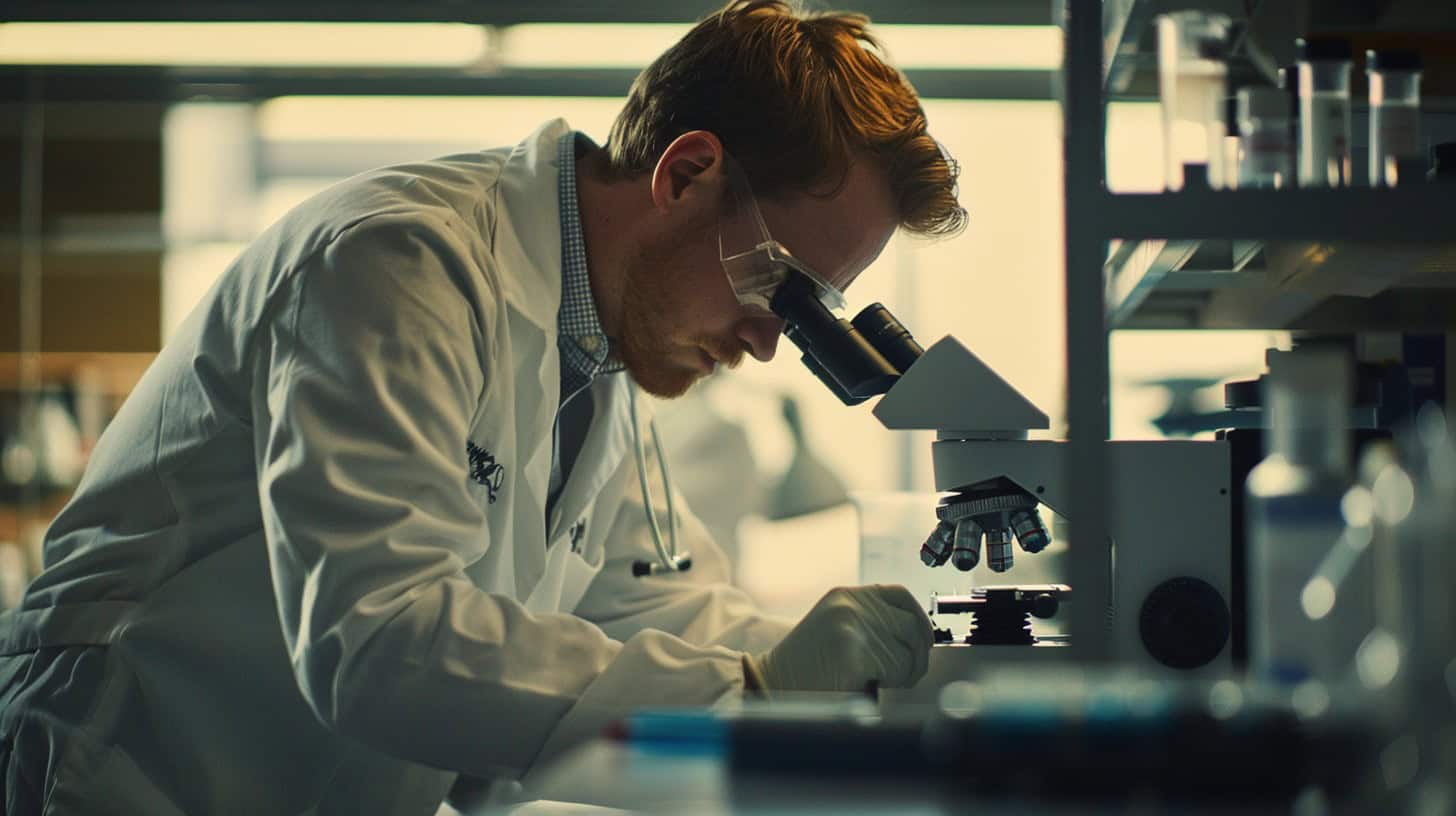Medical lab technicians are vital to healthcare. They analyze body fluids and tissues to help diagnose diseases. This career offers stability and growth. The U.S. Bureau of Labor Statistics projects an 11% job increase for MLTs from 2020 to 2030.
I’ve worked as a medical lab tech for 8 years. I’ve seen the field evolve with new tech and methods. This guide will show you how to start your MLT career. You’ll learn about education, skills, and job options.
Ready to explore this rewarding path?
Key Takeaways
Medical lab technicians play a vital role in healthcare by analyzing body fluids and tissues to help diagnose diseases. The U.S. Bureau of Labor Statistics projects an 11% job increase for MLTs from 2020 to 2030.
To become an MLT, you need a high school diploma or GED and typically complete a 2-year associate’s degree program in medical laboratory technology. Key courses include biology, chemistry, math, microbiology, and hematology.
National certification from organizations like ASCP or AMT is important for career prospects. Some states require licensure, with initial costs ranging from $20 to $245.
Essential skills for MLTs include strong analytical abilities, attention to detail, and good communication. These skills are crucial for accurate testing and reporting results.
Career opportunities exist in hospitals, diagnostic labs, and research facilities. The average salary for MLTs is around $54,180 per year, with options to specialize or move into supervisory roles as you gain experience.
Table of Contents
Defining a Medical Laboratory Technician
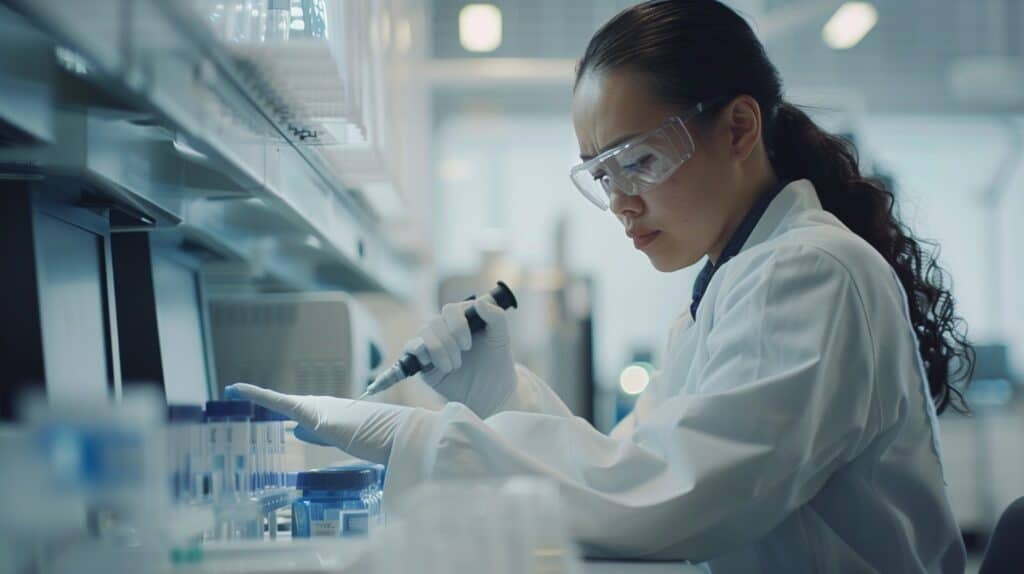
Medical laboratory technicians play a crucial role in healthcare. These skilled professionals collect samples and perform tests on body fluids, tissue, and other substances. They work in hospitals, diagnostic labs, and doctor’s offices, using automated equipment to analyze specimens. 1
Medical lab techs are the unsung heroes of healthcare, providing critical data for patient diagnosis and treatment.
MLTs need a high school diploma or GED to start their career path. They typically complete an associate’s degree program in medical laboratory technology. 2 The COVID-19 pandemic has highlighted their importance in disease diagnosis and prevention.
In a Houston medical lab and across the U.S., MLTs work under supervision to prepare specimens, analyze body fluids, and maintain lab equipment.
Educational Pathways for Aspiring Medical Laboratory Technicians
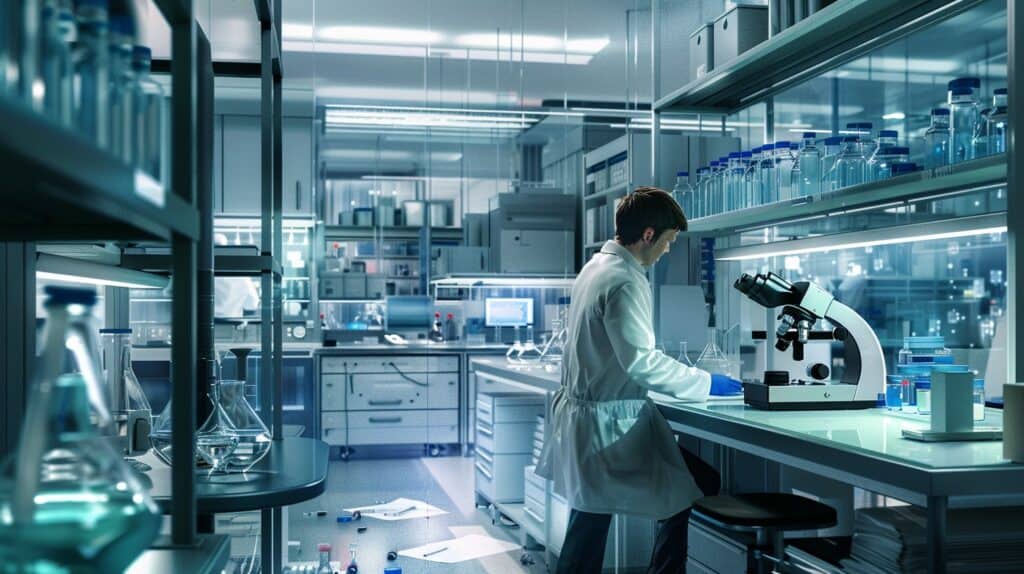
Getting into medical lab tech work starts with good schooling. You can choose between a two-year associate degree or a four-year bachelor’s in clinical laboratory science.
Associate Degree Requirements
An associate degree in medical laboratory technology is your ticket to this rewarding career. The program typically takes 2 years to complete. 3 You’ll need a high school diploma or GED to get started. 3 Strong math and science skills are crucial – expect prerequisite courses in these areas. Many programs also require a background check and drug screening.
Your coursework will cover general education in biology, chemistry, and math. Core clinical classes include microbiology, immunology, and hematology. Hands-on lab training is a key component.
Most programs culminate in an internship, giving you real-world experience. 4 This combination of classroom and practical learning prepares you for certification exams – a must for most healthcare employers.
Key Prerequisite Courses
Aspiring medical lab technicians need a solid foundation in science and math. Key prerequisite courses for associate’s degree programs include:
- Biology: Covers cell structure, genetics, and human anatomy. Builds essential knowledge for understanding medical samples and tests. 3
- Chemistry: Focuses on chemical reactions, lab techniques, and analytical methods. Crucial for interpreting test results and understanding diagnostic procedures.
- Mathematics: Emphasizes statistics, algebra, and data analysis. Essential for accurate calculations and interpreting lab data.
- Physics: Explores principles of energy, mechanics, and optics. Helps in understanding complex lab equipment and procedures.
- Computer Science: Teaches database management and lab information systems. Vital for modern lab operations and record-keeping.
- Medical Terminology: Introduces healthcare language and vocabulary. Improves communication with healthcare professionals and understanding of medical records.
- Microbiology: Studies microorganisms and their impact on human health. Critical for identifying pathogens and conducting infection-related tests. 2
- Immunology: Explores immune system functions and disorders. Necessary for understanding blood typing and immunological tests.
- Hematology: Focuses on blood components and related disorders. Key for analyzing blood samples and diagnosing blood-related conditions.
- Clinical Chemistry: Covers biochemical analysis of body fluids. Fundamental for conducting and interpreting various diagnostic tests.
Certification Processes for Medical Laboratory Technicians
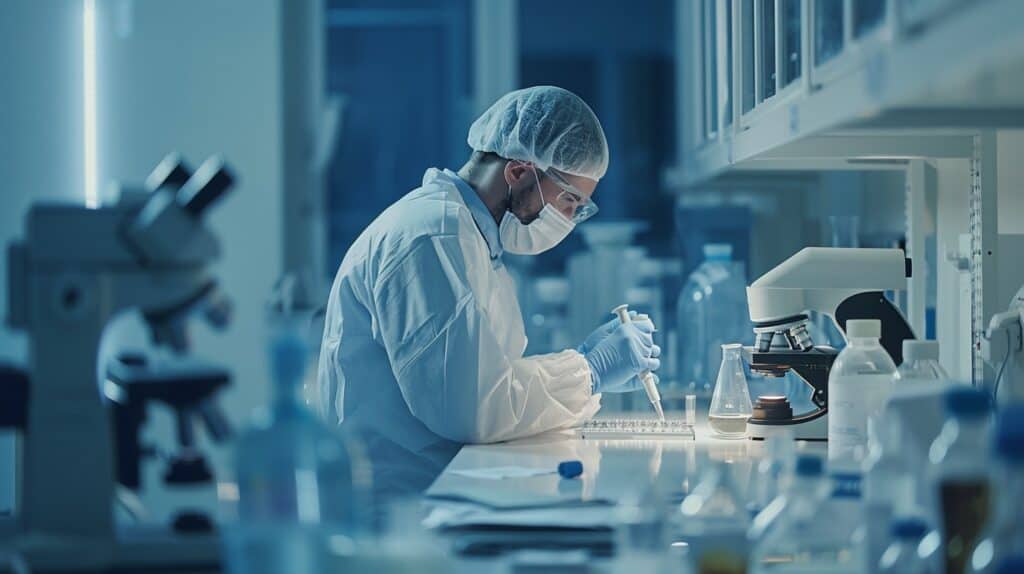
Certification is crucial for medical lab techs. It proves your skills and boosts your career chances.
Options for National Certification
Medical Lab Technicians can boost their careers through national certification. The American Society for Clinical Pathology (ASCP) and American Medical Technologists (AMT) offer respected credentials.
These certifications require passing an exam and meeting education and experience standards. Many employers prefer or require certified technicians. 6
National certification demonstrates a Medical Lab Technician’s commitment to excellence in the field. 5
Certified technicians often enjoy better job prospects and higher salaries. Some states mandate certification for licensure. The ASCP Board of Certification (BOC) and AMT exams cover key areas like chemistry, hematology, and microbiology.
Techs can also pursue specialized certifications in blood banking, cytotechnology, or molecular biology.
State Licensure Guidelines
State licensure for medical lab technicians varies across 11 states. Each state sets unique requirements and fees. Initial licensing costs range from $20 to $245. 7 Renewal periods differ, spanning from annual to biennial cycles.
Lab techs must research their specific state’s rules to ensure compliance.
Certification programs boost qualifications for supervisory roles. These programs focus on specialized skills within the field. Lab techs can enhance their career prospects by pursuing relevant certifications. 8 Staying updated on state-specific guidelines is crucial for maintaining valid licenses and advancing in the profession.
Essential Skills for Medical Laboratory Technicians
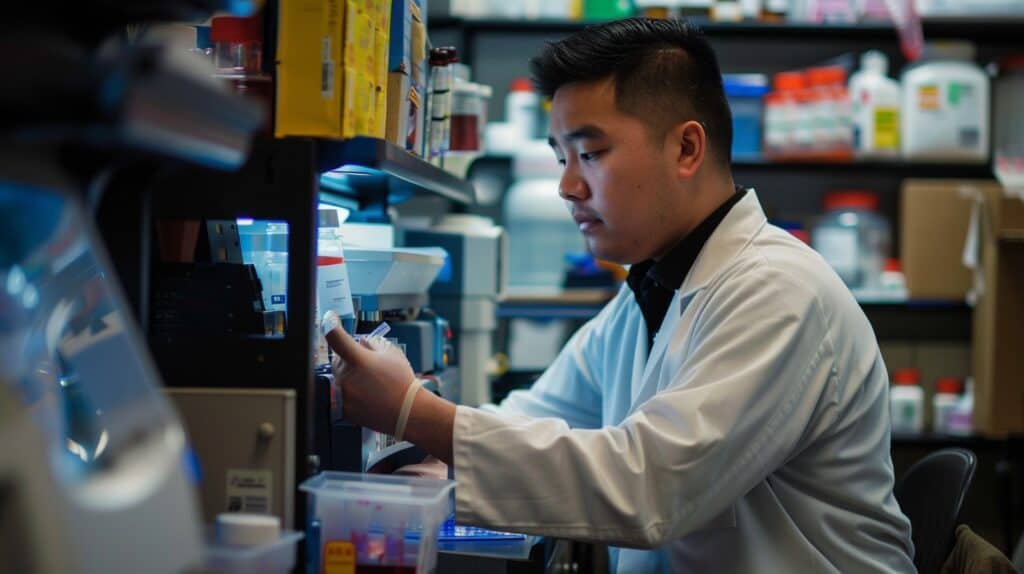
Medical lab techs need sharp skills to excel. You’ll need a keen eye and steady hands to handle samples and run tests.
Developing Analytical Skills
Analytical skills form the backbone of a medical lab technician’s toolkit. These pros dissect complex data, interpret test results, and spot anomalies with eagle-eye precision. Lab techs sharpen their analytical edge through hands-on practice with microscopes, spectrophotometers, and cell counters.
They master pattern recognition in blood smears, bacterial cultures, and tissue samples. This keen eye for detail translates to job security in an ever-growing healthcare field. 9
Strong analytical skills are a basic requirement for a lab technician.
Honing problem-solving abilities is crucial. Lab techs tackle issues like contamination, equipment malfunctions, and safety hazards daily. They develop strategies to work efficiently under pressure, meeting tight deadlines without compromising accuracy.
By constantly challenging themselves with new techniques and technologies, these professionals ensure they’re always at the top of their analytical game. 1
Enhancing Attention to Detail
Medical lab technicians need razor-sharp focus. Precision is crucial when analyzing body fluids and tissues. MLTs must spot tiny abnormalities in samples and record findings accurately. 9 Color vision matters too – subtle hue changes can indicate health issues. Developing this skill takes practice and dedication.
Attention to detail extends beyond the microscope. MLTs calibrate complex equipment and follow strict protocols. One small mistake could lead to misdiagnosis. Careful documentation ensures patient safety and proper treatment.
Next, we’ll explore how strong communication skills benefit MLTs in their daily work. 10
Strengthening Communication Skills
Lab techs need sharp communication skills. Clear, concise reports are crucial for patient care. Practice explaining complex info in simple terms. Role-play tough scenarios with colleagues.
Master active listening – it’s key for teamwork. Seek feedback on your communication style. 11 Join a public speaking club to boost confidence. Learn medical terminology inside out.
Develop rapport-building techniques for patient interactions. Brush up on written communication for accurate lab reports.
These skills matter in job interviews too. Be ready to discuss how you’ve used communication in your work. Share examples of times you’ve explained test results clearly. Highlight instances where good communication prevented errors.
Demonstrate your ability to collaborate across departments. Show how you’ve handled difficult conversations professionally. Emphasize your commitment to ongoing improvement in this area. 12
Career Opportunities for Medical Laboratory Technicians
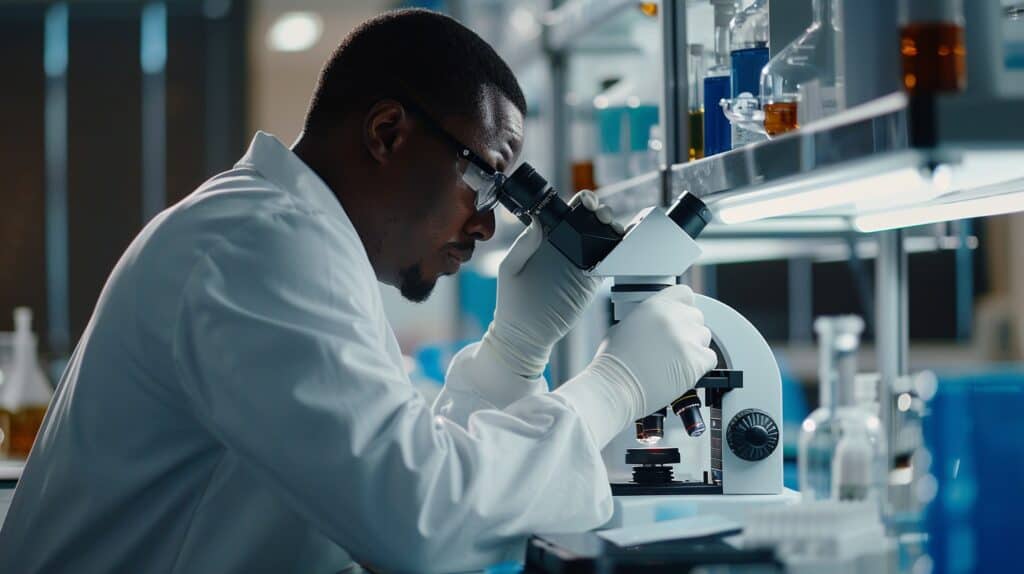
Medical lab techs can work in hospitals, diagnostic labs, or research centers… Want to know more about these exciting career paths?
Roles in Hospitals
Hospital MLTs are vital in patient care. They perform crucial tests in various departments – from emergency rooms to intensive care units. These pros analyze blood, urine, and tissue samples, providing quick, accurate results.
Their work helps doctors diagnose diseases and monitor treatments. 13
MLTs in hospitals often specialize in areas like hematology or microbiology. They use cutting-edge lab equipment and techniques daily. Career growth is promising, with opportunities to become supervisors or lab managers. 9 It’s a lucrative job, with median salaries around $54,180 per year. MLTs contribute directly to saving lives through their precise, behind-the-scenes work.
Positions in Diagnostic Laboratories
Diagnostic laboratories offer diverse roles for medical lab technicians. These facilities specialize in analyzing patient samples to aid in disease diagnosis and treatment. Technicians perform tests on blood, urine, and tissue specimens using sophisticated equipment.
They may focus on specific areas like hematology, microbiology, or molecular diagnostics.
Career prospects in diagnostic labs are promising. The U.S. Bureau of Labor Statistics projects a 13% job growth in healthcare from 2021 to 2031, including opportunities for lab techs. 5 Graduates can find positions in independent labs, clinics, and research facilities. 14 Many roles offer competitive salaries and benefits, making this field attractive for career-minded individuals.
Opportunities in Research Facilities
Research facilities offer exciting career prospects for medical lab technicians. These labs focus on cutting-edge studies, from gene sequencing to drug development. Techs here often work on groundbreaking projects, contributing to medical advancements.
The average salary in this field is $57,800 per year, with a projected 7% growth from 2021 to 2031. 2
Lab techs in research settings handle sophisticated equipment and analyze complex data. They might process human tissue samples, run diagnostic tests, or assist with clinical trials.
This work requires strong analytical skills and attention to detail. Opportunities exist in academic institutions, pharmaceutical companies, and government agencies. Career growth often leads to specialization or supervisory roles. 6
Career Growth in Medical Laboratory Technology
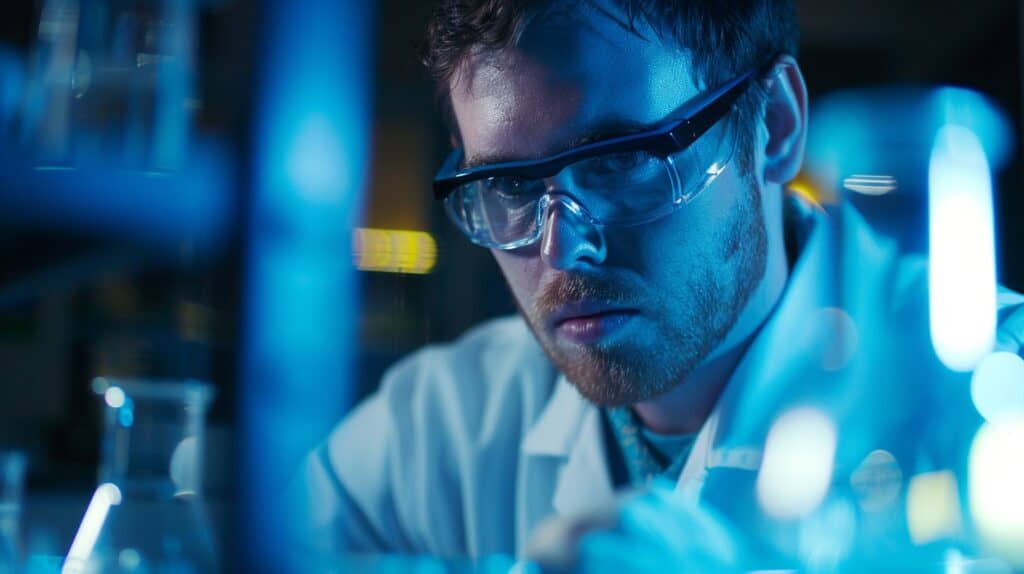
Medical lab techs can climb the career ladder. They can specialize or move into management roles.
Paths to Specialization
Medical lab technicians can specialize through targeted training or advanced education. On-the-job experience often leads to expertise in areas like hematology or microbiology. 15 Pursuing a bachelor’s degree opens doors to roles as medical lab technologists, focusing on complex testing and analysis.
Certifications in specific disciplines, such as cytotechnology or histotechnology, boost career prospects and earning potential. 9 Many techs choose to specialize in blood banking, molecular diagnostics, or clinical chemistry – each offering unique challenges and opportunities for growth.
Opportunities for Supervisory Roles
Lab techs can climb the career ladder to supervisory roles. 1 Experience and leadership skills open doors to management positions. A postgrad or master’s degree in lab tech-related fields boosts chances for promotion.
Taking on extra responsibilities shows initiative and team leadership potential. Supervisors oversee lab operations, manage staff, and ensure quality control. They also handle budgets, equipment purchases, and policy implementation.
Career growth often leads to roles like lab manager or department head. 16
People Also Ask
What education do I need to become a medical lab technician?
You’ll need an associate’s degree or certificate in clinical laboratory sciences. Some jobs may require a bachelor’s degree. Look for programs accredited by the National Accrediting Agency for Clinical Laboratory Sciences (NAACLS).
What skills are important for this career?
Attention to detail, analytical thinking, and lab safety knowledge are crucial. You’ll work with blood, cells, and tissues. Good communication helps when working with physicians and patients.
What tasks do medical lab technicians perform?
They conduct medical tests, analyze samples, and operate lab equipment. Tasks include staining tissues, preparing blood for transfusions, and performing drug-screening tests. They help diagnose illnesses and guide treatment.
How does this job differ from other healthcare roles?
Unlike nurses or physician assistants, lab techs work behind the scenes. They don’t provide direct patient care. Instead, they support diagnosis and treatment through lab work.
Are there opportunities for advancement in this field?
Yes! You can become a medical laboratory scientist or specialize in areas like histology or cytotechnology. Some techs pursue further education to become pathologists or enter medical school.
What’s the job outlook for medical lab technicians?
The field is growing faster than average. An aging population needs more diagnostic testing. Hospitals, clinics, and research labs all need skilled technicians. It’s a stable career in the U.S. economy.
References
- ^ https://in.indeed.com/career-advice/finding-a-job/how-to-become-lab-technician
- ^ https://www.coursera.org/articles/medical-laboratory-technician (2023-11-29)
- ^ https://americanprofessionguide.com/educational-pathways-for-medical-lab-technicians/
- ^ https://www.wgu.edu/career-guide/healthcare/medical-lab-tech-career.html
- ^ https://americanprofessionguide.com/becoming-a-medical-lab-technician/
- ^ https://www.nwhealth.edu/blog/how-to-become-a-medical-laboratory-technician/
- ^ https://www.trustedhealth.com/allied-career-guide/lab-tech/certification-guide
- ^ https://www.op.nysed.gov/professions/clinical-laboratory-technologists/full-license-requirements
- ^ https://americanmedtech.org/Blog/Blog-Post/how-to-become-a-medical-laboratory-technician (2022-05-10)
- ^ https://medium.com/@iphi.edu.in/how-to-become-a-lab-technician-a-step-by-step-guide-6ace0f9ed23b
- ^ https://www.indeed.com/career-advice/resumes-cover-letters/lab-technician-skills (2023-08-10)
- ^ https://americanprofessionguide.com/medical-lab-technicians-skills/
- ^ https://www.neit.edu/blog/how-to-become-a-medical-lab-technician (2024-02-13)
- ^ https://catalog.stlcc.edu/programs/clinical-laboratory-technology-aas/
- ^ https://www.childrensmn.org/2022/08/03/medical-lab-technician-careers-pathways-advancement/
- ^ https://www.forbes.com/advisor/education/science/become-a-lab-technician/ (2023-11-30)
